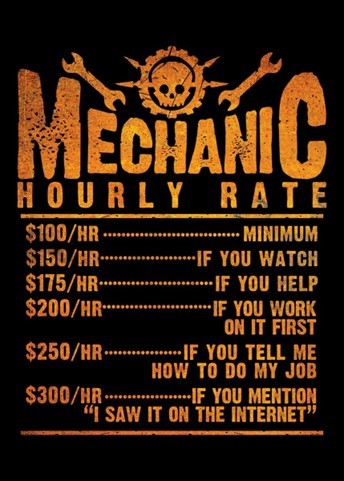Taking your own parts to a mechanic ?
Should You Supply Your Own Parts to Your Mechanic? Weighing the Pros and Cons
In an era of online shopping and DIY culture, many car owners consider sourcing their own vehicle parts for repairs or upgrades. But is it a good idea to take these parts to your mechanic to be fitted? Let's look at the pros and cons of supplying your own parts when visiting a workshop.
Pros of Supplying Your Own Parts:
- Potential Cost Savings: One of the main reasons people consider buying their own parts is to save money. By shopping around and eliminating the mark-up that some mechanics might charge, you could find a better deal.
- Personal Preferences: You may want a specific brand or performance part that your mechanic does not typically use or stock. By sourcing it yourself, you ensure you are getting exactly what you want.
- Educational Value: Researching and buying your parts can be an educational experience. It provides an opportunity to learn more about your car and the components that keep it running.
Cons of Supplying Your Own Parts:
- Warranty Issues: Many mechanics offer warranties on their repairs, but this usually only applies if you use the parts they supply. By bringing in your own parts, you will likely forfeit any guarantee of the work.
- Questionable Quality: Your mechanic will have trusted suppliers that provide reliable quality parts. If you're sourcing your own, especially from less reputable vendors, you might end up with subpar or counterfeit components.
- Mismatched Parts: Even with the best research, there's a risk you might purchase the wrong part for your vehicle or the repair at hand. This could result in return hassles, delays in repair, and potentially more costs.
- Strained Relationships: Mechanics, like all professionals, take pride in their work. Bringing in your own parts might be perceived as a lack of trust or an undermining of their expertise and business model. This could strain your relationship with your mechanic, who you rely on for honest, quality work.
- Potential for Loss: If you provide a part that fails soon after installation, you are typically responsible for the cost of the labour involved in replacing it again, whereas a mechanic would generally cover that labour if they provided the part and it failed.

Conclusion:
While there are potential cost savings and personal advantages to supplying your own parts, there are also significant risks and drawbacks. Before deciding, it's essential to have a candid conversation with your mechanic. Understand their policy, weigh the pros and cons, and make an informed decision that ensures the safety, performance, and longevity of your vehicle. Remember, while saving money is desirable, the reliability and safety of your car should always come first.
send us a message
INSTAGRAM




